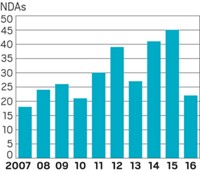Advertisement
Grab your lab coat. Let's get started
Welcome!
Welcome!
Create an account below to get 6 C&EN articles per month, receive newsletters and more - all free.
It seems this is your first time logging in online. Please enter the following information to continue.
As an ACS member you automatically get access to this site. All we need is few more details to create your reading experience.
Not you? Sign in with a different account.
Not you? Sign in with a different account.
ERROR 1
ERROR 1
ERROR 2
ERROR 2
ERROR 2
ERROR 2
ERROR 2
Password and Confirm password must match.
If you have an ACS member number, please enter it here so we can link this account to your membership. (optional)
ERROR 2
ACS values your privacy. By submitting your information, you are gaining access to C&EN and subscribing to our weekly newsletter. We use the information you provide to make your reading experience better, and we will never sell your data to third party members.
Business
Tufts Report Anticipates Upturn
Cites drugmakers' actions to accelerate drug development
by Rick Mullin
January 23, 2006
| A version of this story appeared in
Volume 84, Issue 4
Despite a continued decline in the number of new drug approvals in the U.S. since the mid-1990s, Tufts Center for the Study of Drug Development takes an optimistic tone in its annual pharmaceutical industry outlook, published last week.
Drug developers are positioned to reverse the downtrend, according to the Tufts center's "Outlook 2006," as a result of efforts to incorporate new discovery tools such as pharmacogenomics and to accelerate the pace of translating basic research into viable drug candidates. The report also cites efforts at major drug companies to manage clinical trials more aggressively.
The Tufts report arrives along with new statistics indicating that FDA approved only 20 new drugs last year, down from 36 in 2004.
Albert L. Rauch, a drug industry analyst at A.G. Edwards & Sons, says the downturn is largely the result of a thinning of the early-stage pipeline during the boom years of the late 1990s. Rauch sees this thinning in the context of a natural R&D cycle in the pharmaceutical industry compounded by the advent of new technologies and disciplines, such as genomics, that will take years to show results.
Robert R. Ruffolo Jr., president of Wyeth Research, says he is not surprised at the drop in new drugs coming to market given the high number of approval delays last year. Among the drug candidates for which FDA delayed approval last year are Pargluva, a diabetes treatment from Bristol-Myers Squibb and Merck, and Exubera, Pfizer's inhaled insulin.
In the wake of safety problems with drugs such as Merck's Vioxx, Ruffolo says these delays may indicate that FDA is becoming more conservative with treatments that are not given fast-track priority status. "FDA says there is no appreciable change post-Vioxx, but I'm not sure," he says. Wyeth plans to have six New Drug Applications before FDA this year.
Rauch says he sees no change in FDA's approval process, despite last year's safety concerns. He says the agency has dealt with safety primarily by stepping up labeling, issuing 45 "black box" warnings, the most severe safety label, in just the first half of 2005, compared with 32 in all of 2004. Rauch adds that the shift in corporate resources to postapproval clinical trials has drawn money and resources away from research and trials on new drug candidates.
The Tufts center's report anticipates that FDA will continue to rely on postmarketing studies to monitor safety, while encouraging greater use of exploratory investigational new drug studies to improve clinical trial results. As for the drug companies, the report says they will need to improve drug development processes with new analytical and information management techniques. And it forecasts that joint development partnerships will play an important role.





Join the conversation
Contact the reporter
Submit a Letter to the Editor for publication
Engage with us on Twitter